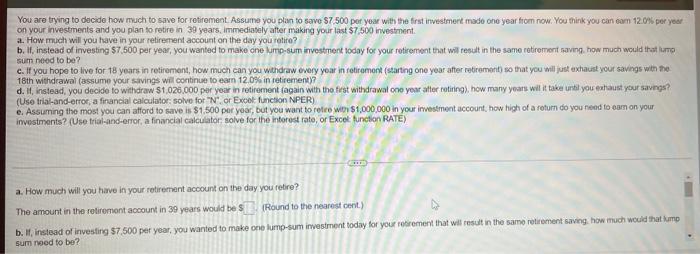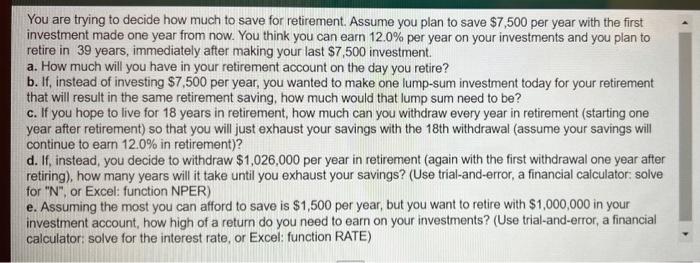You are trying to decide how much to save for retirement. Assume you plan to save $7.500 per year with the first investment made one year from now. You think you can com 12.0% per year on your investments and you plan to retire in 39 years, immediately after making your last $7,500 investment a. How much will you have in your retirement account on the day you retiro? b. If, instead of investing $7,500 per year, you wanted to make one um-sum investment today for your retirement that will result in the same retirement saving, how much would that are sum need to be? c. If you hope to live for 18 years in retirement, how much can you withdraw every year in retromont (starting one year after retiremetit) so that you will just exhaust your savings with the 18th withdrawal (assume your savings will continue to earn 12.0% in retirement? d. If, instead, you decide to withdraw $1,026,000 per year in retirement (again with the first withdrawal one year after retiring), how many years will take until you exhaust your savings? (Uso trial-and-orror, a financial calculator: solve for "N", or Excel function NPER) e. Assuming the most you can afford to save is $1.500 per year, but you want to relce w $1,000,000 in your investment account, how high of a return do you need to eam on your investments? (Use trial-and-error, a financial calculator solve for the interest rate, or Excel function RATE) a. How much will you have in your retirement account on the day you rotire? Round to the nearest cont.) The amount in the rotiromont account in 39 years would be s b. If, instead of investing $7,500 per year, you wanted to make one lump-sum investment today for your retirement that will result in the samo retirement saving how much would that lumo sum need to be? sum need to be? You will need to make one lump sum investment today of S. (Round to the nearest cont.) c. If you hope to live for 18 years in retirement, how much can you withdraw every year in retromont (starting one year after retirement so that you wit just exhaust your swings with the 18th withdrawal (tume your savings will continue to earn 120% in retirement? The amount you can withdraw every year in retirement is $ (Round to the nearest cont.) d. If, instead, you decide to withdraw $1,026,000 per year in retirement (again with the first withdrawal one year after retiringl. how many years will take until you exhaust your savings? (Use thal-and-error, a financial calculator solve for "N" or Excel function NPER) You will exhaust your savings in years, (Round to two decimal places) yo . You will exhaust your savings in years. (Round to two decimal places.) e. Assuming the most you can afford to save is $1,500 per year, but you want to retire with $1,000,000 in your investment account, how high of a return do you need to eam on your investments (Use trial-and-error, a financial calculator solve for the interest rato, or Excel function RATE) You will need a return of (Round to two decimal places You are trying to decide how much to save for retirement. Assume you plan to save $7,500 per year with the first investment made one year from now. You think you can earn 12.0% per year on your investments and you plan to retire in 39 years, immediately after making your last $7,500 investment. a. How much will you have in your retirement account on the day you retire? b. If, instead of investing $7,500 per year, you wanted to make one lump-sum investment today for your retirement that will result in the same retirement saving, how much would that lump sum need to be? c. If you hope to live for 18 years in retirement, how much can you withdraw every year in retirement (starting one year after retirement) so that you will just exhaust your savings with the 18th withdrawal (assume your savings will continue to earn 12.0% in retirement)? d. If, instead, you decide to withdraw $1,026,000 per year in retirement (again with the first withdrawal one year after retiring), how many years will it take until you exhaust your savings? (Use trial-and-error, a financial calculator: solve for "N", or Excel: function NPER) e. Assuming the most you can afford to save is $1,500 per year, but you want to retire with $1,000,000 in your investment account, how high of a return do you need to earn on your investments? (Use trial-and-error, a financial calculator solve for the interest rate, or Excel: function RATE) b. It instead of investing $7,500 per your you wanted to make one lump sum investment today for your retirement that will result in the same retirement saving how much would that lumo sum need to bo? You will nood to make one lumo sum investment todiy of Round to the nearest cone) c. you hope to live for 18 years in retirement how much can you withdraw every year in rotrement (starting one year after retirement) so that you will just exhaust your savings with the 18th withdrawal (assume your savings will continue to eam 120% in retirement? The amount you can withdraw every year in rotiromonto ) (Round to the newest cont) ) d. Instead, you decide to withdraw 51.020,000 per year in retirement (again with the first withdrawal one year after retiring, how many years wit it take until you exhaust your savings? (Use trial and error, a financial calculator solve for 'N'. or Excel function NPER) You wil exhaust your savings in years (Round to two decat places) e. Assuming the most you can afford to save is $1,500 per year, but you want to retire with $1.000.000 in your investment account,how high of a robar do you need to cart on your investments (Us trial-and-orro, a financial calculator solve for the interest rate of Excel function RATE) You will need a rotum of (Round to two decimal places)












![For Mowen/hansen/heitgers Cornerstones Of Managerial Accounting, 6th Edition, [instant Access]](https://dsd5zvtm8ll6.cloudfront.net/si.question.images/book_images/2022/04/6257c87e3025b_1256257c87dcfa77.jpg)